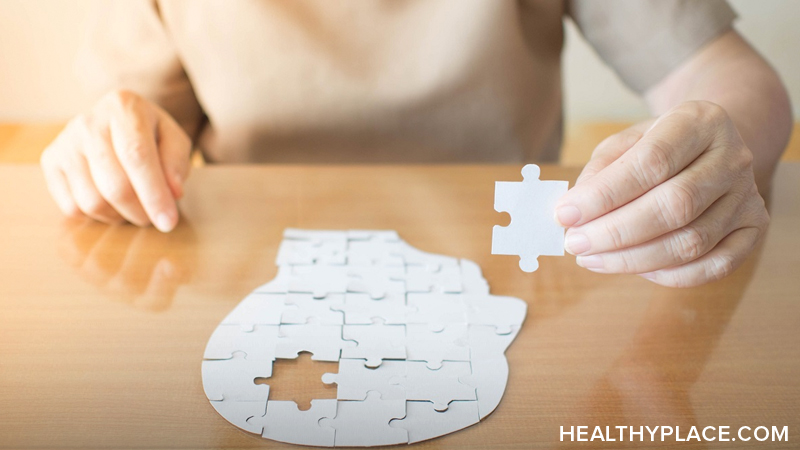Why Does Depression Cause Memory Loss?

Memory loss is a common complaint among people with depression. Far from absent-mindedness or “flightiness,” depression memory loss is a very real phenomenon—and science is proving it. Increasing studies are showing that depression does affect memory and why it disrupts it (Westman, 2019). The more we learn about why depression and memory loss are connected, the more we appreciate the truth that depression is a real, biological illness with far-reaching effects on those who live with it. The following information will shed light on how and why depression impacts memory.
The Nature of Depression Memory Loss
Memory loss is a complex problem. Depending on the illness at work in the brain, people can experience different deficits. Depression memory loss typically involves:
- Difficulty recalling details, such as remembering that friends came over for dinner but having no recollection of what you ate
- Problems with prospective memory, which involves planning and remembering to complete the plans; struggles with this type of memory explain why forgetting to take daily medication isn’t unusual for people with depression
Depression typically affects short-term memory. Memories of the past are often left as complete (or incomplete) as they were before depression hit. Also, depression causes frustrating and stressful experiences in daily life such as losing keys and other objects, remembering where you parked your car, or recalling what you just read.
While everyone has this type of memory loss from time to time, it’s a regular occurrence in depression that can significantly disrupt life. Because of this memory loss, people often describe an inability to function well. Memory loss and feeling unable to function can deepen depression, which in turn can worsen memory problems.
Understanding what is happening in the brain when you have depression can help you be less hard on yourself for your memory issues.
Depression, Stress, the Hippocampus, and Memory Loss
The hippocampus is an important area of the brain involved in depression memory loss. This complex structure:
- Is involved in learning and remembering
- Is sensitive to stress, in part because it contains a lot of glucocortisol (stress hormone) receptors, so when the adrenal glands flood the system with damaging cortisol, it makes its way to the hippocampus
- Atrophies, or shrinks, in people with depression by up to 20 percent (the longer and more severe the depression, the more volume is lost)
- Atrophy involves less new neural growth as well as loss of existing neurons
Depression is often worsened by stress, and depression itself is a stressor. Stress, depression, and the hippocampus have a toxic relationship that can result in memory loss.
In addition to the biological causes of depression memory loss are cognitive contributors. The thoughts people have and the way they think when they have major depression are other factors that cause memory problems.
Cognitive Causes of Memory Loss and Depression
An annoying effect of depression is difficulty concentrating. Brain fog is a real experience for people with depression, and being unable to focus causes frustrations. To commit something to memory requires concentration, so when depression interferes in that ability, memory can suffer.
The quality and content of thoughts affect memory, too. Ruminating is part of depression. When people ruminate, they fixate on negative thoughts and problems, thinking about them repeatedly. The repetition of negative thoughts can commit them to memory, just as repeating information when studying helps with recall.
Because they’re rehearsed, bad memories and negative thoughts stick. Positive thoughts and experiences take a back seat and are forgotten. The same happens with functional thoughts, such as the inability to recall where the car keys are. This isn’t by conscious choice. If you are living with depression, chances are you’re not ruminating on purpose or intentionally remaining in a state of chronic stress. It’s the nature of this very complex disorder and the even more complex human brain.
Managing Depression Memory Loss
Memory loss with depression is usually temporary. As depression lifts, the hippocampus can recover, thinking shifts, and sharper memory returns. You can do things to make this happen:
- Work with a therapist to improve thoughts
- Actively manage stress with such things as exercise, diet, calming activities, mindfulness, meditation, social support, having a sense of purpose and fun, getting enough sleep
- Talk with your doctor about antidepressants; some have been shown to help the hippocampus, but medication isn’t right for everyone
- Also discuss electroconvulsive therapy (ECT) with your doctor, as some studies have linked ECT with neural growth and decreased atrophy in the hippocampus (again, ECT isn’t suitable for all)
Depression and memory loss are very real, brain-based experiences. Things going on in the brain—largely the hippocampus—because of stress and depression help explain why you might have memory loss with your depression.
APA Reference
Peterson, T.
(2021, December 30). Why Does Depression Cause Memory Loss?, HealthyPlace. Retrieved
on 2025, December 5 from https://www.healthyplace.com/depression/symptoms/why-does-depression-cause-memory-loss



